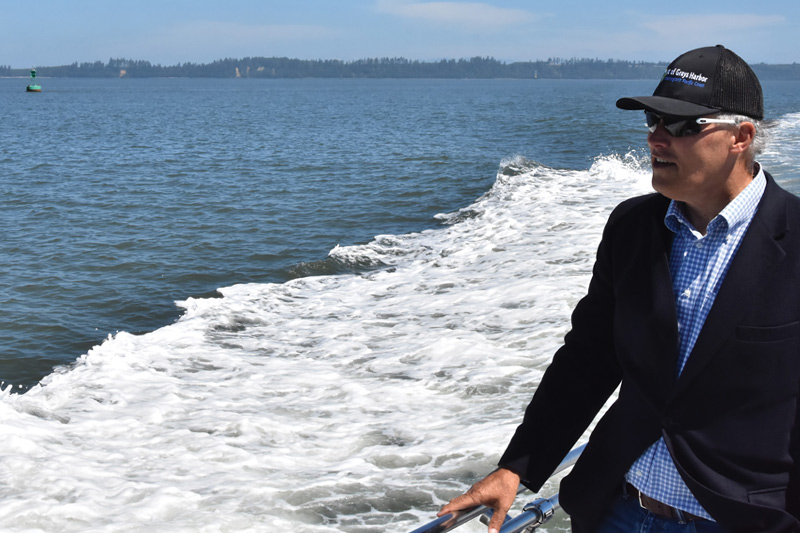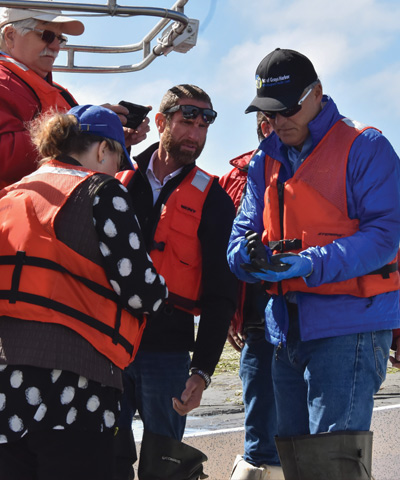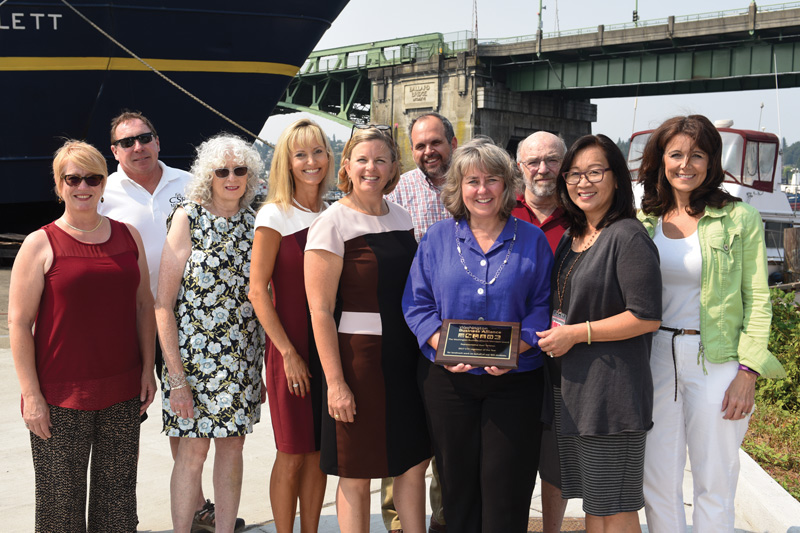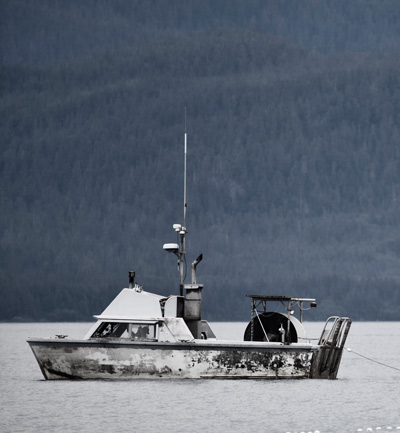
 I was recently able to catch up with Washington Governor Jay Inslee and talk about boating policy as he settles into his second term at the helm. It might surprise some to learn just how comfortable Inslee is on the water. He comes to recreational boating like many of us – his father taught him the intricacies of knot-tying and he has passed along his love affair for the water to his three sons. During a recent legislative visit with the Evergreen State’s 21st Governor, he was quick to point out to my six-year-old that the bowline knot is the “only knot you will ever need.”
I was recently able to catch up with Washington Governor Jay Inslee and talk about boating policy as he settles into his second term at the helm. It might surprise some to learn just how comfortable Inslee is on the water. He comes to recreational boating like many of us – his father taught him the intricacies of knot-tying and he has passed along his love affair for the water to his three sons. During a recent legislative visit with the Evergreen State’s 21st Governor, he was quick to point out to my six-year-old that the bowline knot is the “only knot you will ever need.”
While I was familiar with Gov. Inslee’s love of sailing and his annual boating trips through the San Juan Islands, I left our time together with a better understanding of just how boating informs his outlook as the state’s chief executive. Gov. Inslee said he longs for more of a boating mindset to take hold in Olympia, where the state legislature is fresh off a historically long legislative year.
“I often wish that guiding a budget through the legislature was as easy as catching a summer breeze on a sailboat in Puget Sound. This year has been more like a six-month-long small craft advisory. But we need to stay the course and get things done.”
The Governor was referring to the unique situation Washington finds itself in. For the first time in Washington history, there is no biennial capital budget in place. This framework is one of three “even-year budgets” that set the funding on various state projects. There are several boating facility projects that Gov. Inslee has put in his draft budget that will remain unfunded until an agreement is reached by Republicans and Democrats — which may happen in the fall or may not happen at all. In particular, Gov. Inslee mentions the millions of dollars set aside in the budget for boaters’ benefit, including Aquatic Lands Enhancement Account grants, State Parks funding, and the Washington Wildlife and Recreation Program.

The good news is that not all marine-related activities are wrapped up in the still-to-be-determined capital budget. In fact, the operating budget, which the Legislature agreed to before they ended their session on June 30, will bring $200 million in new investments for career and technical education. Insiders point out that this money would not be possible without Gov. Inslee’s leadership.
The funding was one of the industry’s top legislative priorities for 2017. The Northwest Marine Trade Association (NMTA), the business community that represents the state’s recreational boating industry, joined the Washington Business Alliance (WBA)-led coalition to win over lawmakers. The effort paid off with legislative champions and a Governor who put forth the funding to grow the pipeline of young tradespeople. Given that 10,000 baby boomers retire every day, this win did not come a moment too soon for those who want to get off the hard and back in the water.
“Gov. Inslee gets high marks this year for his funding advocacy on behalf of high school career technical education through our skills centers. Gov. Inslee also deserves praise for putting funding and advocacy behind developing youth apprenticeships for our students at local high schools, providing core academics of math and science through skills-based training in partnership with local industry,” said Jene Jones, education policy adviser for the bipartisan WBA, which is the group that is credited for shepherding this legislative win.
“These apprentices earn high school credit, college credit, pay, and experience in high demand family wage careers,” Jones said.
“High school graduates completing these emerging apprenticeship programs at their local school are directly employable upon high school graduation. We hope Gov. Inslee continues to support work-based learning experiences for all students as a part of the high school experience, so that all students graduate career- and college-ready.”
While Jones lauded Gov. Inslee’s support of the skills centers, she emphasized that skills centers only serve a portion of the state. “Yes, the Governor should be applauded for this advocacy, but those within the maritime industry need to continue to point out that there are only 15 skills centers in the state. We will continue to press the Governor to bring this same level of public advocacy for skills centers to the career technical education programs happening in each junior high and high school across the state,” she said. “Many students cannot travel to a skills center. When we consider equity in educational opportunities, supporting our local school programs is paramount.”
State Rep. Gael Tarleton was recently recognized by the WBA for her work to secure the student funding. “With this career and technical education funding, the kids are the winners,” she said. “And our state’s future as a global leader in the maritime and manufacturing jobs feels a bit more secure.”
Aside from career skills, there are number of facets to boating politics that I discussed with the Governor. One thorny issue is the state’s inability to remove the commercial gillnets from the Columbia River. The Governor admits that fish politics are complex.

“There are a lot of diverse perspectives on what has been done and what more needs to be done to recover imperiled fish populations,” he said. “But fish conservation is based on science and must include reductions from all human-caused limiting factors.” Chief among those factors, according to industry experts, are the gillnets that exist in the Columbia River.
To that, Inslee recently collaborated with Oregon lawmakers for a solution. “The buyback (of commercial gillnet licenses) contemplated by the commissions in Oregon and Washington was not a total fleet buyback. It was to better match the number of boats with the anticipated catch; in other words, it was intended to leave an economically viable fleet,” Inslee said.
The recreational fishing community has long asked Governor Inslee to push forward on this subject. Led by a coalition of recreational anglers and business associations, advocacy efforts have pivoted towards working with Oregon and Washington administrations to work together in ridding the main stem of the Columbia River of commercial gillnets. This type of fishing poses problems because it does not discriminate between endangered wild salmon and their hatchery-raised counterparts.
This coalition, led by Fish Northwest, points to a letter written by Governor Inslee that brings a fresh take on the importance of recreational fishing. In the letter, Governor Inslee encourages the Fish & Wildlife Commission “(to) consider economic factors when setting seasons” and what’s more, that he was “convinced that we can prioritize and expand fishing opportunities for the 800,000 Washingtonians who purchase fishing licenses annually…”
Another important part of the advocacy effort has been the reappointment of Larry Carpenter to the Fish & Wildlife Commission. Larry’s background (as former NMTA board chair and owner of Master Marine) and willingness to speak up for recreational fishing during commission meetings made his reappointment a top priority for the sportfishing lobby. Governor Inslee took action in early August to support Carpenter’s role on the commission, which pleased many on the recreational side.
Outside of boating and fishing, Gov. Inslee has used his bully pulpit to showcase Washington’s outdoor recreation economy throughout his tenure. It was three years ago that the Governor pulled together an Outdoor Recreation Task Force to help him get a better handle on the $26.2 billion economy that too often goes unnoticed because it’s predominantly composed of small businesses. The task force developed 13 recommendations, many of which were tied to improving laws and regulations around boating and fishing. Boating’s place as the largest slice of the outdoor recreation economy helps explain why boating policy was given so much space in the task force’s final report.

“I have a great appreciation for how boating in Washington state improves our economy and enhances our quality of life. I recently visited Westport Yachts in Grays Harbor County and got a tour of the facility,” the Governor said. “They are supporting a lot of local jobs, making beautiful vessels right here in Washington that will go all over the world. It was a joy to see the craftsmanship and precision of their work.”
But that doesn’t mean Gov. Inslee and the boaters are always in lockstep. A proposed No Discharge Zone (NDZ) would affect boaters that have traded up for state-of-the-art Marine Sanitation Devices. Under the current NDZ plan, which would be the nation’s largest, these treatments systems would be illegal to use.
The vast majority of boaters (about 99 percent) will not see a change in boating policy outside of a potential increase in policing of their heads. It’s the larger boats and the tug and barge industry that this policy would impact. The Governor and the Washington Department of Ecology have continued to push forward on this NDZ even though boating interests have advocated for targeted No Discharge Zones approach throughout Puget Sound.
“It is very clear that those that live, work, and play on Puget Sound are extremely committed to its health and resiliency,” he said. “Our maritime community are leaders in innovation, sustainability, and best practices. We know that the maritime industry is a willing partner in our efforts to restore and protect Puget Sound. One of the many ways we can protect Puget Sound waters is through an NDZ under the Clean Water Act and is included in the Action Agenda set forth by the Puget Sound Partnership as a part of the ongoing efforts to restore and protect Puget Sound.”
The Department of Ecology has engaged with the boating and maritime community over several years to find the right path toward implementing an NDZ for Puget Sound. Going forward, Ecology is now engaging in a formal rule-making process that will get even more feedback from the public and direct stakeholders.”
But the maritime industry and users have disagreed on this subject.
“The NDZ continues to move forward with what we see as questionable science and faulty data, and without incorporating proposals from those who spend significant portions of their lives on the water,” said Recreational Boating Association of Washington (RBAW) President Wayne Gilham, who has been involved in the NDZ discussions for several years.

“Boaters are environmentalists, and we work collaboratively and effectively with the Governor and his agencies on issues like derelict vessel removals, boater education and enforcement, and heightened efforts to prevent the spread of aquatic invasive species. Recreational boaters are committed to outcomes that ensure clean water and a healthy environment, but we think there are better and more effective ways to get there than a Puget Sound-wide NDZ designation.”
The NDZ is on the path to become a new regulation. Washington’s Department of Ecology will begin formal rule-making soon, and boaters will have a chance to make their voices heard. However, those who have been involved in the process are doubtful that this advocacy will amount to anything.
As with any relationship, it’s worth reiterating that there are areas of agreement and disagreement. Washington state has a lot of momentum when it comes to boating, boating businesses, and boating leadership. Could the state assert itself with even more boating-friendly policies? Certainly, there’s work left to do to make Washington even friendlier to boats. Looking at other states and the success they have had with keeping boats in the state versus driving them away, boaters can see how more needs to be done.
Fortunately, Washington has a governor that knows the difference between a chart and a map, which is always an enviable position to begin discussions around the mantra that “boating means business.” A track record of working with the Governor and significant members of his staff all bode well for future collaboration between Olympia and the Washington boating community.
As the Governor wrapped up the interview, he said, “I know there are many, many beautiful places throughout our state that can only be enjoyed from a boat.”
I’m not certain how many of Governor Inslee’s 20 predecessors have had that keen understanding.